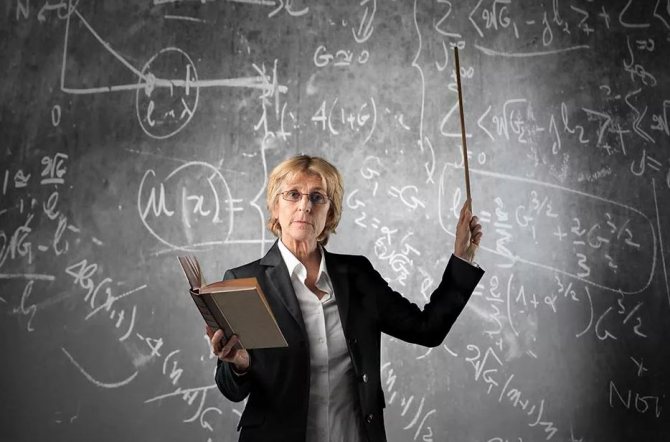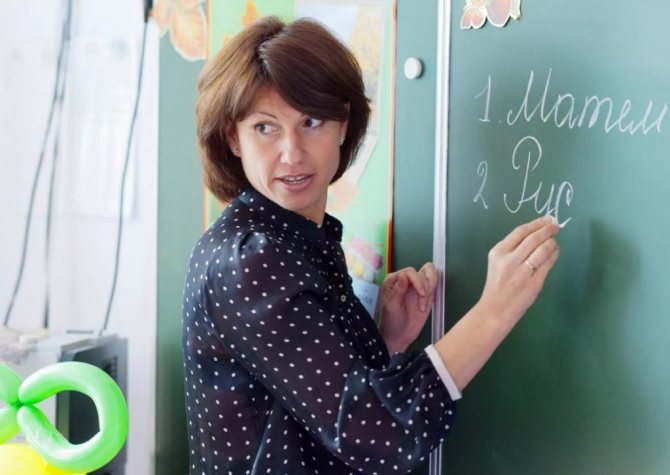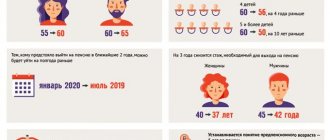- home
- Reference
- Privileges
Many citizens who have reached retirement age are increasingly asking questions related to their financial security in old age. For the majority of the population, the reforms taking place in the country related to changes in the pension system are not entirely clear, and many people are already confused in the incessant stream of bills and initiatives.
However, it is already obvious that the retirement age in the country is increasing, but questions arise regarding the categories of workers who have benefits when entering retirement. These include, among others, teachers in preschool institutions.
How can a teacher earn a preferential pension?
The size of a future teacher's pension depends on the amount of contributions to the Pension Fund. The more contributions, the higher the pension will be. At the same time, teaching staff also need to monitor working time standards in order to maintain the right to a preferential pension.
An educator can receive a pedagogical pension only if a combination of three conditions are met:

Full time teacher
Future retirees should pay special attention to the last item from the above list. A year of teaching experience will be counted only if a certain number of hours are worked per week.
For different representatives of the teaching professions, these standards are established individually:

There are some exceptions. Additional benefits are provided to teachers from rural schools. They are not required to work full-time for the entire 25 years. To receive a preferential pension, such teachers do not need to confirm their working hours. A similar condition has been established for primary school teachers.
Heads of educational institutions may also fail to comply with working time standards. This:
- Deputy Head for Academic Affairs;
- Deputy Head for Educational Work;
- Deputy Head for Training and Production Work;
- Deputy Head for Educational Work.
For a person in the years when he held one of the above positions, working time standards are not taken into account when considering the right to a preferential pension.
But the head of an educational institution will have to confirm his teaching work on an equal basis with ordinary employees. Its volume must be at least 240 hours per year. The director does not have to teach only at his own institution. He can conduct classes in several educational institutions in order to fulfill the required annual quota.
It is most difficult for citizens holding the following positions:
- Deputy Head for Research;
- Deputy Director for Methodological Work.
They can also use years of service in specified positions to receive a preferential pension. But in this case, you should provide documents that can serve as confirmation of direct participation in the educational process.
What counts towards teaching experience?
Years of work in educational institutions are counted as teaching experience. Moreover, the citizen must work in a profession or occupy a position specified in the List of Specialties. 1 year of work in one of the positions in the list of specialties is considered as 1 year of experience for a preferential pension.

What counts towards teaching experience?
The experience also includes time:
- paid leave (both annual and additional);
- temporary disability (illness);
- maternity leave;
- study leave;
- probationary period when hiring;
- attending advanced training courses;
- studying at an educational institution (until 1993).
The most questions and disputes arise regarding the inclusion of parental leave in the length of service for a preferential pension.
Until 1992, a woman could stay at home with her child for one and a half years. This period could be taken into account in the 25 years of experience required to receive a teacher’s pension. Since October 1992, this rule has ceased to apply. The entire period of parental leave is not included in the length of service for a preferential teacher's pension. This issue has been raised more than once by legislators.
In 2004, this problem was considered by the Constitutional Court. He put an end to this dispute. The period of maternity leave after October 1992 is not taken into account in teaching experience. If a woman was on maternity leave before October 1992, then the old norms apply to her. Therefore, the Pension Fund will take into account her one and a half years of preferential teaching experience.
PROCEDURE FOR DETERMINING TEACHING WORK EXPERIENCE
The main document for determining the length of teaching experience is the work book.
Pedagogical work experience not confirmed by entries in the work book can be established on the basis of properly executed certificates signed by the heads of the relevant institutions, sealed, issued on the basis of documents confirming work experience in the specialty (orders, service and tariff lists, personnel records books , time books, archival inventories, etc.).
Certificates must contain information about the name of the educational institution, the position and time of work in this position, the date of issue of the certificate, as well as information on the basis of which the certificate of work was issued. In case of loss of documents on teaching experience, the specified experience can be established on the basis of certificates from previous places of work or on the basis of written statements of two witnesses, whose signatures must be notarized. Witnesses can confirm experience only for the period of joint work.
In exceptional cases, when it is not possible to confirm the length of service with the testimony of witnesses who knew the employee through joint work and during the period of this work, the bodies subordinate to which educational institutions are located may accept the testimony of witnesses who knew the employee through joint work in the same system.
The teaching experience includes:
– pedagogical, leadership and methodological work in educational and other institutions in accordance with Appendix 1 to these Recommendations;
– time of work in other institutions and organizations, service in the Armed Forces of the USSR and the Russian Federation, training in institutions of higher and secondary vocational education - in the manner prescribed by Appendix 2 to these Recommendations.
Pedagogical activity, which is taken into account when applying clause 2 of Appendix 2 to these Recommendations, means work in educational and other institutions provided for in Appendix 1 to these Recommendations.
LIST of institutions, organizations and positions, the time of work in which is counted in the teaching experience of educators
| Name of institutions and organizations | Job titles |
| Educational institutions, except institutions of higher and additional professional education (advanced training) for specialists. | Teachers, teachers, speech pathologists, speech therapists, speech therapists, teacher-organizers (basics of life safety, pre-conscription training), heads of physical education, senior masters, masters of industrial training (including training in driving vehicles, working on agricultural machines, work on typewriters and other organizational equipment), senior methodologists, methodologists, senior instructors-methodologists, instructors-methodologists (including physical education and sports, tourism), accompanists, music directors, senior teachers, educators, class teachers, social educators, educational psychologists, educational organizers, additional education teachers, senior trainers-teachers, trainers-teachers, senior counselors, physical education instructors, labor instructors, directors (chiefs, managers), deputy directors (chiefs, managers) for educational, educational, educational, industrial, educational, cultural and educational work, industrial training (work), foreign language, flight training, general education training, regime, heads of educational units, heads (chiefs) of practice , UKP, speech therapy centers, boarding schools, departments, divisions, laboratories, offices, sections, branches, courses and other structural units whose activities are related to the educational (educational) process, methodological support, senior duty officers, duty officers, accompanists, cultural organizers, tour guides. |
| Health care and social welfare institutions, orphanages, children's homes (sanatoriums, clinics, clinics, hospitals, etc.), as well as departments, wards for children in adult institutions. | |
| Educational institutions of higher professional education. | Faculty, accompanists, accompanists. |
| Higher and secondary military educational institutions | Work (service) in teaching and teaching positions. |
| Educational institutions of additional professional education (advanced training) for specialists; methodological institutions of all types (regardless of departmental subordination). | Teaching staff, senior methodologists, methodologists, directors (heads), rectors, deputy directors (heads), vice-rectors, heads of sectors, offices, laboratories, departments; scientific workers whose activities are related to the educational process and methodological support. |
| Educational management bodies and bodies (structural divisions) that manage educational institutions. | Management, inspector, methodological positions, instructor positions, as well as other specialist positions (with the exception of work in positions related to economic, financial, business activities, construction, supply, office work). |
| Departments (bureaus) of technical training, personnel departments of enterprises, associations, organizations, divisions of ministries (departments) dealing with training and advancement of personnel in production. | Full-time teachers, masters of industrial training of workers in production, management, inspector, engineering, methodological positions, whose activities are related to the issues of training and advanced training of personnel. |
| Educational institutions of ROSTO (DOSAAF) and civil aviation. | Management, command-flight, command-instructor, engineering-instructor, instructor and teaching staff, industrial training masters, engineer-instructors-methodologists, engineer-pilot-methodologists. |
| Dormitories of institutions, enterprises and organizations, housing maintenance organizations, youth housing complexes, children's cinemas, theaters for young spectators, puppet theaters, cultural and educational institutions and divisions of enterprises and organizations working with children and adolescents. | Educators, teacher-organizers, educational psychologists, (psychologists), teachers, additional education teachers (leaders of clubs) for children and adolescents, instructors and methodological instructors, trainers-teachers and other specialists in working with children and adolescents, heads of children's departments , sectors. |
| Correctional colonies, educational colonies, prisons, medical correctional institutions and pre-trial detention centers. | Work (service) with a pedagogical education in the positions of: deputy head for educational work, head of a detachment, senior inspector, inspector for general education work (training), senior inspector-methodologist and inspector-methodologist, senior engineer and engineer for production and technical training, senior foreman and master of industrial training, senior inspector and security and regime inspector, head of the educational and technical office, psychologist |
Note.
Pedagogical work experience includes time spent working as a teacher-defectologist, speech therapist, educator in health care and social welfare institutions, methodologists of the organizational and methodological department of a republican, regional, regional hospital.
PROCEDURE FOR CREDITING INTO PEDAGOGICAL EXPERIENCE WORK TIME IN SEPARATE INSTITUTIONS (ORGANIZATIONS), AS WELL AS STUDYING TIME IN INSTITUTIONS OF HIGHER AND SECONDARY PROFESSIONAL EDUCATION AND SERVICE IN THE ARMED FORCES OF THE USSR RUSSIAN FEDERATION
1. For teaching staff, the following are included in their teaching work experience without any conditions or restrictions:
1.1 The time spent in military service under a contract is calculated at the rate of one day of military service for one day of work, and the time spent in military service by conscription (including officers called up for military service in accordance with the Decree of the President of the Russian Federation) - one day of military service for two days of work;
1.2. Time spent working as a film library manager and film library methodologist.
2. For teaching staff, the following periods of time are counted in their teaching work experience, provided that these periods, taken both individually and in aggregate, were immediately preceded and immediately followed by teaching activities:
2.1. Time of service in the Armed Forces of the USSR and the Russian Federation, in the positions of officers, sergeants, petty officers, warrant officers and midshipmen (including in the troops of the Ministry of Internal Affairs, in the troops and security agencies), except for the periods provided for in paragraph 1.1.;
2.2. Time spent in management, inspector, instructor and other positions of specialists in the apparatus of territorial organizations (committees, councils) of the trade union of workers of public education and science of the Russian Federation (education, higher education and scientific institutions), in elected positions in trade union bodies, in instructor and methodological positions in pedagogical societies and boards of children's foundations, as a director (manager) of a teacher's home (public education worker, vocational education worker), commissions on the affairs of minors and the protection of their rights or in departments of social and legal protection of minors, in crime prevention units (inspectorates for minors, children's rooms of the police) internal affairs bodies;
2.3. Time of study (full-time) in graduate school, institutions of higher and secondary vocational education that have state accreditation.
3. In addition to the periods provided for in paragraphs 1 and 2 of this procedure, the length of teaching work of certain categories of teaching staff includes the time spent working in organizations and the time of service in the Armed Forces of the USSR and the Russian Federation in a specialty (profession) corresponding to the profile of work in an educational institution or profile subject taught (course, discipline, club):
– teacher-organizers (basics of life safety, pre-conscription training);
– teachers and physical education teachers, heads of physical education, physical education instructors, instructors-methodologists (senior instructors-methodologists), trainers-teachers, (senior trainers-teachers);
– teachers, teachers of labor (vocational) training, technology, drawing, fine arts, computer science, special disciplines, including special disciplines of general education institutions (classes) with in-depth study of individual subjects;
– teachers of additional education;
– teaching staff of experimental educational institutions;
– educational psychologists;
– methodologists;
– teaching staff of institutions of secondary vocational education (departments) of culture and art, music-pedagogical, art-graphic, music;
– teachers of institutions of additional education for children (culture and art, including music and art), teachers of special disciplines of music and art general education institutions, teachers of music disciplines of pedagogical schools (teacher colleges), music teachers, music directors, accompanists.
4. For educators (senior educators) of preschool educational institutions, children's homes, the teaching experience includes the time spent working as a nurse in a nursery group of preschool educational institutions, as a guard nurse in children's homes, and for teachers of nursery groups - the time spent working in medical positions.
5. The right to resolve specific issues about the compliance of work in institutions, organizations and service in the Armed Forces of the USSR and the Russian Federation with the profile of work, the subject taught (course, discipline, club) is granted to the head of the educational institution in agreement with the trade union body.
6. Time spent working in the positions of assistant teacher and junior teacher is counted toward the length of teaching experience provided that during the period of work in these positions the employee had a pedagogical education or studied at an institution of higher or secondary vocational (pedagogical) education.
7. For employees of institutions and organizations, the time of teaching work in educational institutions, performed in addition to the main job on an hourly basis, is included in the teaching experience if its volume (in one or more educational institutions) is at least 180 hours in the academic year
In this case, only those months during which teaching work was carried out are counted in teaching experience.
8 In cases of reduction in the length of teaching work experience calculated in accordance with this procedure in comparison with the experience calculated according to previously valid instructions (see clause 1.2 of Section 1), employees retain the previously established length of teaching work experience.
In addition, if teaching staff during the period of application of the instructions (see clause 1.2 of section 1 of these recommendations) could have included certain periods of activity in their teaching experience, but for some reason they were not taken into account, then the workers retain the right to their inclusion in the teaching experience in the previously established manner.
Registration of a preferential pension
Applying for a preferential pension should be done in advance. A citizen can independently check how the positions he held during his working life are recorded in the work book, and whether they coincide with the names in the List of Specialties. If there are inconsistencies, it is better to resolve this issue before contacting the Pension Fund. You should contact the organization where the teaching activity took place to obtain documents confirming the teaching activity.
About a year before your expected retirement, you can contact the territorial body of the Pension Fund. If inaccuracies and errors are found in the documents, government agency employees can assist in obtaining the necessary information.
The long-service pension for teaching staff in 2020 is assigned in the same way as the old-age pension in the general manner.
The citizen must provide:
- statement;
- passport;
- work book. If some records are missing or there are inaccuracies, then other documents confirming periods of work as a teacher may be provided.
The above documents are submitted 30 days before the expected retirement. They must be reviewed within 10 working days. After which a pension is assigned.
What is included in the teaching experience
Many people ask the question: “What is included in teaching experience?” To answer this question in more detail, you will need to refer to an extract from the legislation of the Russian Federation.

The calculation of working days that relate to teaching experience begins from the moment the teacher enters into an agreement with any educational institution. However, other teaching activities are not taken into account when calculating. As a rule, a professional must get a job in an educational institution, having previously concluded an official employment contract. Other teaching activities that are not included in the general provisions of the legislation will not be counted as work experience. For example, a teacher engaged in tutoring does not have the right to obtain work experience in the field of education.
What is included in the teaching experience:
- The number of days worked in the field of education or total length of service.
- Continuous work experience for primary school teachers.
How is a teacher's pension calculated?
The preferential pension for teaching staff is calculated using the same formula as for other pensioners:
SP is the size of the pension.
IPC – individual pension coefficient. In 2019, it must be at least 16.2 for a teacher. Only upon reaching this value does a person have the right to early retirement.
SPK – pension point value. In 2020 – 87.24 rubles.
FV – additional payment. In 2020 – 5334.19 rubles.
KvFV – increasing coefficient. It applies to late registration of pensions.
Who is entitled to retire on preferential terms?
To take advantage of early retirement, the following conditions must be met:
- Employment experience is at least twenty-five years.
- From 2020, to receive preferential pension payments, a personal coefficient of at least 11.4 is required, in 2020 - 13.8, and annually it will increase by 2.4 and in 2025 it will reach 30.
- For length of service, work experience is required in established institutions in certain positions determined by law.
Categories of teaching staff
List of teaching positions for preferential pensions:
- heads of educational organizations;
- deputies for educational activities;
- class teachers;
- teachers;
- speech therapy workers;
- labor education teachers;
- workers in the field of defectology;
- music education teachers;
- physical education teachers;
- employee psychologists in training organizations;
- teachers of preschool institutions.
Changes for 2020
In 2020, a transition period began for a preferential teacher pension. The retirement age for men and women has been increased. Such changes also affected the procedure for registering a teacher’s pension.

Changes in the pension system 2020
Starting from 2020, a deferment has been introduced for this category of payments. Those. You can retire only after a certain period after completing 25 years of service. In 2020, the deferment period is 1 year. Every year its size increases by another 1 year.

However, there are some benefits. If a teacher has accumulated 25 years of experience in the period from 01/01/2019 to 12/31/2020, then the deferment can be reduced by 6 months.
Let's look at an example. A person’s teaching experience will reach 25 years in May 2020. He may retire as early as November 2020. If the 25-year period of service begins in May 2021, then you will be able to retire only in May 2014.
Only teachers whose work experience was completed before 01/01/2019 can retire according to the old rules (i.e., without a deferment period), but the person did not apply for a preferential pension. In this case, there will be no deferment when assigning a pension.
How to properly apply for an early pension as a teacher. employees?

To assign a preferential pension, ped. the employee needs to come to the nearest PF with the necessary documents. You can apply either independently or by sending a representative. At the moment, you can do this through the government services portal.
List of provided documentation:
- identification;
- documents confirming work in the education system;
- child's birth certificate;
- SNILS;
- statement.
Summing up
We have put together several basic and important theses that will answer all questions:
- Labor or insurance experience is calculated only if there is an official place of work, where the teacher enters into an agreement with the employer on the basis of the country’s labor code.
- Pedagogical experience does not include registration of individual entrepreneurs, since labor activity in the field of education is prescribed in the legislation of the country. For example, this includes working as a teacher in secondary schools, nurseries and kindergartens, art schools, colleges and universities.
- Work in state or municipal organizations that have the right and permission to engage in teaching activities.
In addition, teaching experience also includes:
- maternity leave, but for up to six years;
- academic leave required by a teacher to care for a disabled person;
- Military service;
- temporary incapacity, where the teacher receives social insurance payments.
Teaching experience is a special form of calculating labor activity, since it takes into account not only hours worked, but qualifications, position and working conditions. Everything is simple here: the higher the level of pedagogical education, the greater the total pension in the future. It is extremely undesirable for teachers to interrupt their work experience for a long period, because each year worked affects the registration of a pension.
Cancellation of long-service pension
The legislation of the Russian Federation, which was in force from the collapse of the USSR until 2001, established several basic criteria when teaching employees with 25 years of general experience in educational institutions received the right to early registration of pension benefits. This included length of service, position as a citizen, and place of work. The age reached by the teacher at the time of receiving the opportunity to apply for a pension did not play a role.
After 2001 (until 2020), certain innovations were introduced into the legislation governing the establishment of preferential payments to teachers. This included:
- changing long-service compensation benefits to a preferential age pension;
- clarification of the concept of 25 years of teaching experience (intervals of study and military service are excluded);
- introduction of the principle of choice (continuation of work or retirement);
- regulation of the pension amount by the presence of contributions to specialized funds;
- The list of persons enjoying such benefits has been clarified.
At the same time, the general principle of using the concept of “length of service,” although it has undergone external changes, still remains in the normative field. The legislator left for teachers the possibility of receiving a pension earlier than that established for ordinary citizens.
Remember, the long-service pension for teaching staff has not been abolished, but has been replaced by the possibility of preferential retirement upon reaching a certain age.





